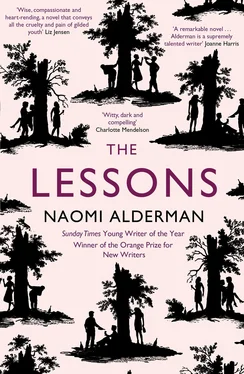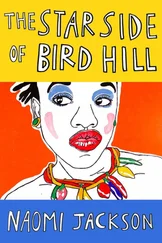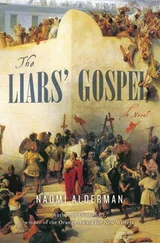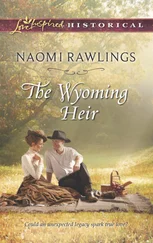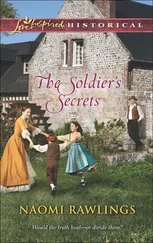After the ceremony, we stood in the street with our families, taking photographs of each other in our robes. Emmanuella’s family were polite to us, but distant; more interested in talking with her boyfriend. Franny’s family and Simon’s embraced. My parents and Jess’s greeted each other slightly nervously — they had met several times before but not often enough to have become easy in one another’s company. Jess’s father bent in to kiss my mother, who simultaneously took a step backwards and made an awkward little noise, so he missed her face completely. Eloise, Simon’s little sister, tugged on Jess’s father’s sleeve and asked if he was really a doctor and if so what were the symptoms of rickets. And it was there that the photograph was taken. Nicola was holding Daisy: a little girl, half-baby, half-toddler, babbling and charming in red leather sandals and a white embroidered dress over her nappy-clothed bottom. Mark borrowed Jess’s camera, Nicola hoisted Daisy on to one hip, Mark waved, Nicola smiled, Daisy grabbed for her earring and the picture was taken.
And then what happened? Then, I think, Mark grabbed her from Nicola’s arms, clasped her to him and then made as if to drop her, catching her before she fell, swinging her into the air as she laughed and gasped. Nicola watched with a frown.
‘Mind her arms, Mark. She’s too heavy to swing.’
Mark wrapped his arms around Daisy’s waist and brought his face close to the place where her neck met her shoulder.
‘You’re not too heavy, are you, darling?’
Daisy was wriggling, trying to escape down to the ground.
‘What’s more, you are brilliant. You are my brilliant, beautiful daughter and one day you’ll come to Oxford just like your father.’
Daisy chuckled and babbled at him. He lifted up her dress, blew a raspberry on her tummy and she screamed with fear and delight.
She grew tired later, as children do, and we were all surprised, I think, by how tiresome it can be to spend time with a cross child. Mark and Nicola were the first people we knew to have a baby, we had not yet learned of their trials and difficulties. Nicola strapped her into the pushchair and Daisy did not like this at all. We were in the entrance hall of the Randolph — Mark had booked us all rooms there and though our parents had tried to protest, they had not done so strenuously. Mark paid for things in Oxford; it was not worth fighting the inevitable. On arrival, there was a little wait and Daisy became fractious, struggling against the bindings of her chair, desperately trying to push them out of the way so she could escape. Nicola offered her pieces of cut apple or dried apricots in an attempt to distract her, but she rejected these angrily.
Daisy writhed in her chair, whimpering and bellowing, pushing the straps down again and again, fiddling with the buckle over her stomach. She was trying, it was clear, to open it the way she had seen her parents open it so many times in the past. But her coordination wasn’t good enough; she twisted and screamed and yelled.
‘I’m going to let her out,’ said Mark.
‘No,’ said Nicola, firm as a rap on the hand. ‘Look at this place. She’ll just spill people’s coffees on them, and break things and hurt herself. Leave her there. It’ll only be another few minutes. She can have a nice run around outside soon.’
Daisy was working herself into a furious rage, twisting and turning, plucking at the straps. Jess and I, Franny and Simon looked at her mutely. Despite our inexperience it was clear that we couldn’t just let someone else’s child out.
‘I have to find a bathroom,’ said Nicola. ‘Try her again with the apple?’
Nicola disappeared around the corner. Mark, holding a limp plastic bag containing brown apple chunks, looked at us, then at Daisy. He put one finger to his lips, winked and knelt down in front of the pushchair. Daisy, with red, tear-filled eyes, grew quiet staring at him as he stared at her.
‘Look, Daisy,’ he said.
He took one of her little pudgy hands and pressed it on to the pushchair buckle. He pressed down himself too, until the buckle sprang open. Daisy wriggled free, hiccuping and stumbling in her haste to get out of the chair.
‘You all saw,’ said Mark. ‘She let herself out, didn’t she? There was nothing we could do.’ He leaned over to kiss Daisy’s head.
She, now calming down, put her hand out for his and led him off to try to eat the bowls of potpourri.
When Nicola returned, Mark shrugged and said, ‘She must have learned how to do it herself,’ and Nicola was too distracted preventing Daisy from hurling herself into the fireplace to consider this very carefully.
For memory’s sake in the late afternoon we visited the old house in Jericho, rather like grandchildren paying a visit to an elderly relative — hoping for treats, dreading to see signs of decrepitude. The house had been shut up for several years now, and the garden was almost as overgrown as when I had first visited it. The base of the sundial was covered by long grass, the brambles had made the pathway to the frog pond impassable. The house itself had that damp smell again, a smell of old rot.
We were charmed to find Franny’s elaborate revision timetable still on the wall in her old bedroom, with the days counting down to finals crossed out until the very last one, still left uncrossed. Simon’s old room contained piles of his lecture notes — most of which started hopefully at the top of the page, but quickly degenerated into elaborate doodles with the occasional jotted word or book title. Emmanuella had left clothing, books, a shelf full of CDs and video cassettes. When questioned she shrugged and said, ‘But these are not my favourites, you know.’
I think, that if Mark had suggested then that we all come back to live in the house we might have agreed. We had been sufficiently bruised by the difficulties of adult life to make this house seem more of a paradise. But he was too busy with Daisy. He walked down to the carp-pond with her, held her so she could see the orange fish circling under the water and sprinkled breadcrumbs on the surface for them to rise, open-mouthed, to feed. Daisy made the same motions with her mouth, opening it into a wide circle of O and closing it again. It occurred to me that if the fish were still alive, someone must have arranged for a gardener to be tending them. But the functioning of Mark’s life was still opaque to me then.
Later on, we all lay on our backs in the long grass next to the sundial.
‘This is the wonderful thing about loving Oxford,’ said Mark. ‘She will never change. Our youth will always be here waiting for us if we want it.’
I was expecting him to make the same promises and plans he always did: come back and live with me, stay here, let’s be here forever. But he didn’t. Daisy had changed something. I suppose he finally had a reason to want to separate from us.
I had been surprised in general by how much Mark doted on Daisy. When they were together he was constantly holding her, tickling her, singing to her, making faces for her. I had expected that he would be uninterested in fatherhood until the baby became an alert toddler — because then she would be able to give him her attention. Instead, he was transfixed from her first puzzled, finger-grasping days, blinking at the world with dark blue eyes.
He sang ‘Daisy, Daisy, give me your answer, do’ to her when she was a baby and a little later in life she would believe that he’d written the song specifically for her. Jess and I had visited for her christening and I watched him rock her to sleep in the nursery. The room was small, just enough for a cot, a changing table, a child’s wardrobe filled with expensive Italian baby clothes sent by Mark’s mother and little cardigans knitted by Nicola’s grandparents. It smelled of faeces and nappy-rash cream and talcum powder.
Читать дальше
